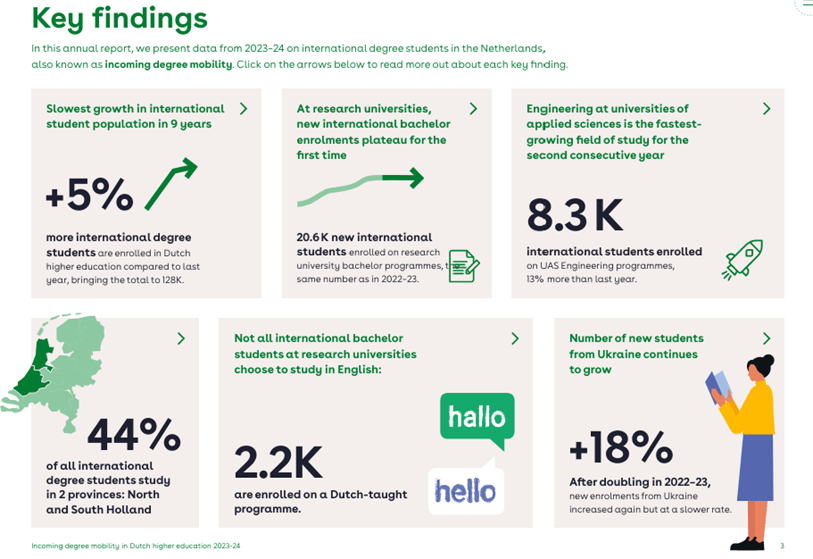In May 2024, Nuffic published a report presenting the latest facts and figures on university degree students coming from abroad to pursue a Bachelor’s or Master’s degree in the Netherlands in the academic year 2022-2023. The analysis is based on national register data from the Education Executive Agency (Dienst Uitvoering Onderwijs) for international and Dutch students enrolled in full degree programmes at publicly-financed higher education institutions between 2006-07 and 2023-24. The key findings are presented below (also see an infographic).
- The total of 128,004 international students were enrolled in the academic year 2023-24 (+5.4% increase compared to 2022-23), with the largest share of those enrolled in research university Bachelor’s programmes;
- More than a quarter of the student population at research universities is international whereas universities of applied sciences experience a rise in new international enrolments, especially at master’s level;
- Non-EEA student population (27.9%) grows nearly twice as fast as EEA student population (72.1%) although the recent reintroduction of the basic student grant might (positively) affect EEA enrolments in the next academic year.
- Germany, Italy and Romania continue to be the top 3 countries of origin for international degree students in 2023-24 similar to the two preceding years;
- Among the top 10 non-EEA countries, China had the largest absolute increase in total student numbers (+624; 6,207 in total) whereas the UK was the only country in this group to see a decline; Ukraine went from 10th to 8th place (+348; 1,428 in total).
- Economics attracts the most international students while Engineering still growing the fastest.
- University of Amsterdam maintains the largest international degree student population, followed by Maastricht University.
- While Dutch remains the main teaching language in 7 out of 10 fields of study at bachelor’s level; there is a steady growth in English-taught programmes at master’s level since 2016.
The new government issued a coalition agreement report on 16 May, anticipating further restrictive measures and funding cuts for the sector, particularly when it comes to international development cooperation. A more detailed coalition agreement is expected to be published in September.

